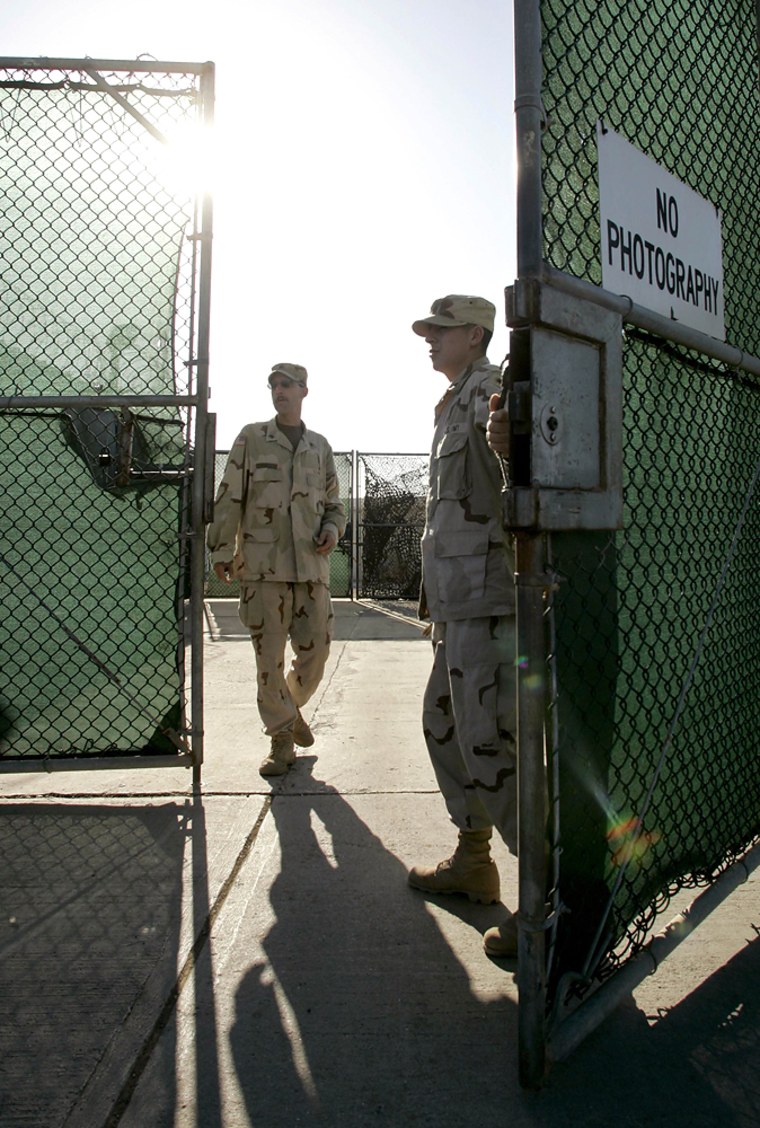A U.N. investigation has concluded that the United States committed acts amounting to torture at Guantanamo Bay, including force-feeding detainees and subjecting them to prolonged solitary confinement, according to a draft report obtained Monday.
U.S. officials rejected the report, saying it was riddled with errors and treated statements from detainees’ lawyers as fact.
The report from five U.N. human rights experts also recommended the United States close Guantanamo Bay and revoke all special interrogation techniques authorized by the Department of Defense.
It accused the United States of violating the detainees’ rights to a fair trial, to freedom of religion and to health.
The report also said that although 30 days of isolation was the maximum permissible period, some detainees were put back into solitary confinement after very short breaks and lived in “quasi-isolation for up to 18 months.”
Using photos and video, the report said some prisoners transported to Guantanamo were shackled, chained, hooded, kicked and stripped.
‘Amounting to torture’
“The excessive violence used in many cases during transportation ... and forced-feeding of detainees on hunger strike must be assessed as amounting to torture,” it said.
The draft report, which follows repeated claims by prisoners at Guantanamo Bay that they have been mistreated or denied their rights, was delivered to the United States on Jan. 16. It was first disclosed Sunday by the Los Angeles Times.
Harsh conditions, including placing detainees in solitary confinement, stripping them naked, subjecting them to severe temperatures or threatening them with dogs could amount to torture, if used simultaneously, the report said. Forced-feeding of hunger strikers through nasal tubes caused intense pain, bleeding and vomiting.
Regarding hunger strike allegations, State Department spokesman Sean McCormack said prison doctors follow “accepted international practice” and treat those on hunger strike in a “humane way.”
Based on peacetime laws
American officials said the most significant flaw of the report was that it judged U.S. treatment of detainees according to peacetime human rights laws. The United States contends it is in a state of conflict and should be judged according to the laws of war.
“Once you fail to even acknowledge that as the legal basis for what we’re doing, much of the legal analysis that follows just doesn’t hold,” a State Department official said.
The official spoke on condition of anonymity because the United States has not formulated an official public response to the draft.
The five U.N. experts have mandates that cover torture, freedom of religion, health, independent judiciary and arbitrary detention. They started working together in June 2004 to monitor conditions at Guantanamo Bay.
They were appointed to their three-year terms by the 53-nation U.N. Human Rights Commission, the global body’s top rights watchdog.
About 500 people are being held in Guantanamo on suspicion of links to al-Qaida or Afghanistan’s ousted Taliban government, and charges have been filed against 10 detainees.
The draft report, which will be presented to the next session of the rights commission, dismissed the U.S. claim that the war on terror constitutes an armed conflict. It also said that the detainees at Guantanamo had a right to challenge their detention, and that right was being violated.
‘Serious violations’
“In the case of the Guantanamo Bay detainees the U.S. executive operates as judge, as prosecutor, and as defense counsel,” the report said. “This constitutes serious violations of various guarantees of the right to a fair trial before an independent trial.”
Manfred Nowak, the U.N. special investigator on torture and one of the five experts, said the report was a draft and had not incorporated U.S. comments. It was expected to be made public later in the week.
“It is a preliminary version,” Nowak said, refusing to comment on its substance. “This is an unauthorized preliminary report which might be changed.”
U.S. officials faulted the experts for rejecting an invitation to visit Guantanamo Bay, saying it fundamentally undermined the accuracy of their findings.
“The U.N. rapporteurs were invited to visit Guantanamo Bay, and they chose not to,” said Richard Grenell, spokesman for the U.S. mission to the United Nations in New York. “Had they visited, they would have found that there is no torture going on.”
In an unusually heated briefing Monday, McCormack added that the United States made a “good faith offer” to the U.N. envoys to visit the prison.
The five experts had sought invitations from the United States to visit Guantanamo Bay since 2002 and accepted the offer in December. But they reversed that decision when they were told they would not be allowed to interview detainees.
McCormack dodged questions about whether it would have been possible for the envoys to do a complete report without access to detainees.
“Fact-finding on the spot has to include interviews with detainees,” Nowak said. “What’s the sense of going to a detention facility and doing fact-finding when you can’t speak to the detainees? It’s just nonsense.”
